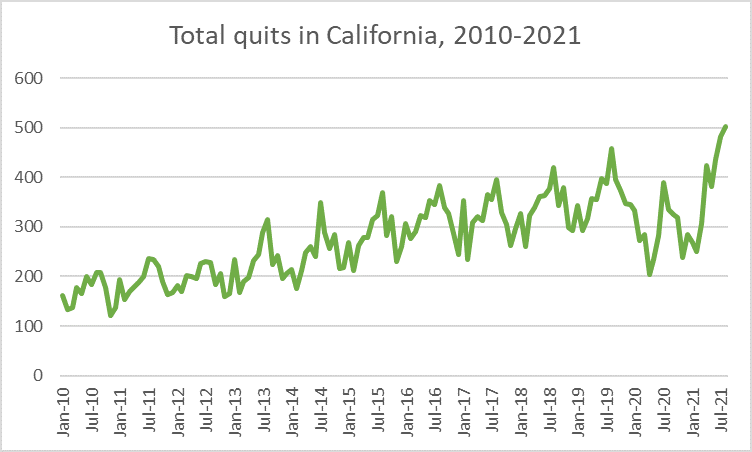Is the "Great Resignation" happening out here?
It's about worker power, but it could be gendered as well
Workers are quitting their jobs at a rapid rate. Nationally, about 4.3 million workers quit their jobs in August 2021. It’s happening in California, too. We don’t have data for just the Inland Empire, but it is safe to say that quits are also rising out here.
People usually quit their jobs when they know they can find something better. As economic conditions improve, quits tend to go up. Here is what the quits data looked like prior to the previous economic downturn – i.e., the Great Recession:
Quits fell in 2008 and 2009 when times got hard because there were fewer alternative options for workers. As the economy started to recover in 2010 and 2011, quits started to pick back up. Here is how things have evolved in California since 2010:
If quits are related to the health of the economy, the problem is that right now, quits are high even though unemployment is not low. Back in early 2020, the state’s unemployment rate was hovering around 4%. In August 2021, the state’s unemployment rate was 7.5%. The state’s labor force is also about 500,000 workers short of where it was pre-pandemic, meaning an even larger proportion of the state’s workforce is now quitting.
But even though the unemployment rate is high, the truth is that the economy is doing OK, and so the rise of quits still makes sense. In the Inland Empire, labor force growth is relatively strong, and average pay continues to increase (see below). People are quitting, but many are finding better jobs in the process.
In this sense, the “Great Resignation” might not be anything to get upset over; it shows that workers are finding jobs that better fit their life goals or which pay, or treat, them better. As wages continue to increase and as the legacy of Striketober lives on, it’s important to remember that workers deserve good pay and working conditions, and they should be free to search until they can find those things.
One disturbing trend that disrupts this narrative is the exodus of female workers from the labor market. The closure of schools last year meant that women, as primary caregivers for children, experienced greater pressure to leave the labor market than men. It is not clear the extent to which this happened in California or the Inland Empire, but I plan to focus on this question in this Friday’s “special topics” post. Please stay tuned and please share this article widely.





